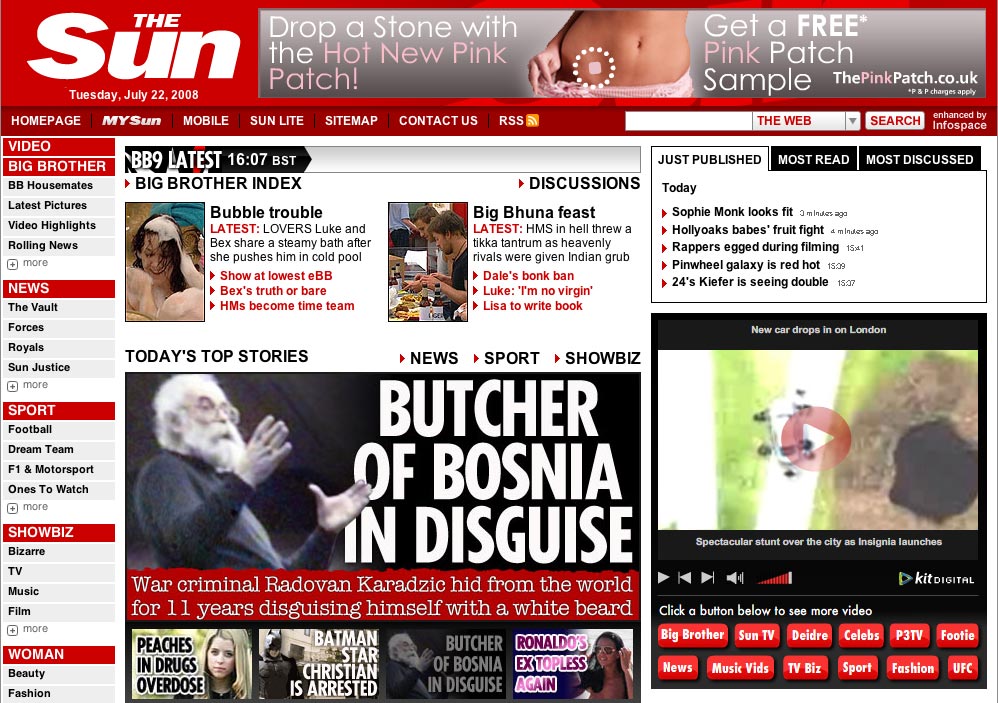Roy Greenslade blogs about the Daily Mash, a satirical news site set up 18 months ago by two British journalists.
Tag Archives: Roy Greenslade
Media Guardian: Economist sold on the street
Roy Greenslade comments on The Economist’s decision to use street vendors to sell copies on London’s streets, in a trial beginning today.
After the blogging storm
The winds have slowed down to a tropical storm, but the Gustav blogging continues.
The mainstream media is reporting on the blogging phenomenon as well as the actual hurricane: the Chicago Tribune looks at the decision-making power of blogs and FollowTheMedia comments that the hurricane may stop print, but not the web.
Meanwhile, over at Poynter, NPR’s Andy Carvin examines the role of social media in Gustav coverage.
As we posted yesterday, this was one for the Twitterers and they tweet on as people assess the damage. A quick twitter local search shows how the twitterers regard the media professionals… The complete mobile version, on the other hand, gives you a full package of the Nairabet desktop site on your mobile phone, including online casino games

Pictures can be found easily on this Flickr search and over at gustavbloggers.com they reflect that it wasn’t as bad as they feared. Meanwhile, to prepare for reportage of the next natural disaster, the Blog Herald offers its disaster blogging tips.
Sun’s Page 3 widget breaks download records
A Page 3 girl widget for RSS feeds, launched by The Sun on Friday, has beaten previous download figures for Sun apps after only three days, the newspaper has said.
The Keeley Hazell application (see below) was built using Adobe Air – a new piece of technology, which allows one widget to be built that will be compatible with both PC and MAC systems.

Further editorial developments are planned for the site over the next few weeks to build on changes to the site navigation and page design introduced last week.
The homepage is longer and features a panel on the right-hand side showcasing breaking news, ‘most read’ and ‘most discussed’ articles.

In addition, users are now taken directly to the article after clicking on a homepage headline, rather than visiting the section homepage.
The changes to the homepage have received criticism from media commentator Roy Greenslade, who asked if the revamp was a reaction to the Daily Mail’s recent relaunch.
However, Danny Rogers, The Sun’s editorial manager (online), said the new features were the result of long-running development.
“It has nothing to do with the Daily Mail. This has been going on for the last six months,” he told Journalism.co.uk, adding that the changes were aimed at displaying content in a more accessible and user-friendly way.
Independent News and Media is no ‘digital ostrich’ says O’Reilly
Gavin O’Reilly, chief operating officer of Indepenent News and Media (INM) and president of the World Association of Newspapers (WAN), has responded to criticism of the publisher’s digital strategy by media commentator Roy Greenslade.
INM has adopted a ‘platform agnostic’ policy for growing its media, O’Reilly wrote in a comment responding to Greenslade, and is not investing in print at the expense of online.
“[T]he O’Brien saga is a distraction from the stark reality facing a company that has put its faith in the longevity of newsprint and averted its gaze from the digital future. It has invested online, of course, but it is way behind many other newspaper companies,” Greenslade wrote, likening INM to a ‘digital ostrich’.
According to O’Reilly, the facts speak for themselves:
INM online revenues grew by 111.5% last year and its 100 websites attract 12 million monthly unique users.
Reports of a ‘volatile’ advertising situation, he added, are not a result of print vs online or structural shifts within INM, but a result of the wider economic downturn.
Nashua Telegraph video of Clinton aide arrest is in public interest, says online editor
The Nashua Telegraph‘s decision to publish a 15-minute video of Sidney Blumenthal, aide to presidential candidate Hillary Clinton, while he was in police custody has been criticised by media commentator Roy Greenslade.
Writing on his blog, the former editor of The Daily Mirror said the video was ’embarrassing, humiliating and overly intrusive’.
“To show the footage of a person undergoing ritual humiliation while in police custody is a disgraceful act. It serves no public interest whatsoever,” he wrote.
Damon Kiesow, managing editor and online editor of the Telegraph, told Journalism.co.uk that the decision to publish the video was ‘typical practice’:
“During the course of our coverage we have published booking photos, police records and court documents related to the case. This is typical practice for us. In fact the story with the video also included a PDF containing nine pages of records including the sentencing document.”
Far from seeking to ‘humiliate’ Blumenthal, Kiesow said the paper – and other US media – had previously been accused of covering up his arrest by not reporting it immediately to protect Clinton’s election campaign.
“The Telegraph has been publishing video on the Web for almost three years. During that time we have published numerous court-related segments including police interviews and court hearings.
“Some have been very graphic and painful in detail but were published due to a significant local interest in the stories.
“The Nashua Police Department only recently implemented the technology that makes it possible for us to gain access to booking videos. Blumenthal is the second booking video we have requested, the first was not published due to technical difficulties on our end.”
Publishing the video was not an attempt to cast aspersions on Blumenthal, but was intended to give readers the opportunity to make up their own minds – with all the information provided.
“I think Roy Greenslade frames the question ‘why publish’ in exactly the wrong way, and by doing so pre-supposes both the answer and the potential public reaction to the video. In fact, this was the first story in our coverage that garnered any positive reader comments for Blumenthal.
“Obviously those predisposed to support or oppose Blumenthal will interpret it as they want. But it is not our place to try and guess what those interpretations are. We felt in this case, and in general, that supplementing our reporting with source documents is the best way to let readers make up their own minds.”
Is there an issue here about the medium: is multimedia content such as this more intrusive, as Greenslade suggests, and therefore arguably less in the public interest? Or does it better serve the readers by giving them all the information available?
Rusbridger attacks Chinese ‘censorship’ as Tibetan riots quelled
Guardian editor Alan Rusbridger has written to the Chinese ambassador in the UK attacking China’s censoring of foreign news websites – including Guardian.co.uk – in the wake of the Tibetan riots.
Mr Rusbridger asked for the ambassador’s assistance in unblocking his website back online and ensuring that access to it remained free of interference.
“As you will be aware, the blackout has coincided with media coverage of the recent unrest in Tibet, forcing the conclusion that this is an act of deliberate and wholly unacceptable censorship,” wrote Mr Rusbridger.
“We are dismayed that Beijing should curtail international press freedom, particularly in Olympic year.”
The move comes in the wake of a violent crackdown on protests in Tibet by Chinese authorities that have also attempted to block the media from reporting what was going on.
Tibetan exiles say at least 80 protesters died in the clashes as reporters were being forced to leave.
The Foreign Correspondents Club of China reported that as many as two-dozen reporters have been turned away from or forced to leave Tibetan areas and government censorship of the internet and television broadcasts was also hampering journalists’ work.
“Reporting interference is not in the interest of the Chinese government which is trying to show a more open, transparent and accountable image to the world,” said FCCC President Melinda Liu, in a piece carried on the FCCC website.
“Such interference is not in keeping with reporting regulations adopted during the Olympics period – and is especially not in keeping with the international community’s expectations of an Olympic host nation,” added Liu.
Writing for the Telegraph.co.uk Richard Spencer claimed to have been ordered to leave the Tibetan town he was staying in by local police (Spencer also points to some bloggers who are managing to get information onto the net about the crackdown)
The Honk Kong Journalists Association (hat tip Roy Greenslade) is also reporting that journalists from at least six Hong Kong media organisations have been placed under escort and ordered out of Lhasa, the Tibetan capital.
Rise in web traffic for Myfootballwriter.com
Commenting on Roy Greenslade’s analysis of Newsquest’s advertising decline, myfootballwriter.com‘s Rick Waghorn has indicated some traffic success for MFW’s Ipswich site.
According to Waghorn, unique users to the site increased from 5,500 in December last year to 22,000 by January.
In terms of advertising, Waghorn added, the number of banner, button and sky ads delivered by the site has increased ’13-fold’ year-on-year to 1.3 million last month.
“We may still have a long way to go in getting our commercial model to catch up with the editorial one, but having just witnessed our new Ipswich Town site quadruple in uniques in a month… at least I’m not going quietly into the night,” he writes.
Journalism industry reaction to ‘churnalism’ claims
The publication of journalist Nick Davies’s book, Flat Earth News, in which he makes the accusation that a significant proportion of the news served by UK institutions is simply regurgitated PR or wire copy by time pressured hacks with too much work on their plates, has caused a wave of strong reaction through press watching circles.
Davies claims that journalists are failing at the essential job of telling the truth by ever greater commercial drives in the industry:
“Where once we were active gatherers of news, we have become passive processors of second-hand material generated by the booming PR industry and a handful of wire agencies, most of which flows into our stories without being properly checked. The relentless impact of commercialisation has seen our journalism reduced to mere churnalism,” he wrote in the Press Gazette.
Taking a donation from the Rowntree Foundation, Davies asked the journalism department at Cardiff University to research home news coverage (download report here: quality_independence_british_journalism.pdf ) in the UK’s leading national newspapers over a two week period, he claims that the research found that only 12 per cent of the stories were wholly composed of material researched by reporters. For eight per cent of the stories, researchers couldn’t be sure. Yet for the remaining 80 per cent they found were wholly, mainly or partially constructed from second-hand material, provided by news agencies and by the public relations industry.
Media commentator for The Independent, Stephen Glover, claimed the book presents ‘a damning picture of a dysfunctional national press which is spoon fed by government and PR agencies’. Glover added ‘Many journalists will recognise his portrait of editorial resources being stretched ever thinner’.
But he sees the more damning element of the book to be its attack on the relationship between the Observer newspaper and the Blair Government:
“It is amazing stuff. Mr Davies suggests the editor and the political editor of a great liberal newspaper were suborned by Number 10, and so manipulated that The Observer became a government mouthpiece. Not even The Times’s endorsement of Chamberlain’s appeasement policy in the 1930s involved the degree of editorial submission to governmental power that Mr Davies alleges in Flat Earth News.”
Although broadly in agreement with Davies, Peter Wilby wrote in the Guardian that his methodology and conclusions of increased workloads hadn’t quite made allowances for some of the positives changes in the newsroom:
“Davies overstates his case. For example, the internet, email and mobile phones have all made information and contacts more easily accessible. It isn’t, therefore, unreasonable to expect journalists to fill more space. Time spent “cultivating contacts” was, in any case, often time spent on overlong, overliquid lunches. But experience also tells me his argument is fundamentally sound”
There was a little more scepticism about the research from Adrian Monck, he wrote that study ‘links full-time employees to pagination’:
“But what about: freelance employees? Bought-in copy? The amount of agency material used? Changes in technology? The reduction in the number of editions?
“Could any of these things have a bearing on the analysis? And shouldn’t journalists be more productive? What about these innovations: Electronic databases, computers, mobile telephones, the Internet?”
He also takes issue with Davies line about PR being used to fill news pages, suggesting that it’s not a new argument.
Simon Bucks, Sky News associate editor, also draws out the point that new technology can negate some of the issues brought up.
“There’s a wider point in this debate. Web 2.0 allows the public to play a much bigger role in journalism. If we get a fact wrong or miss out something important, it won’t take long before someone lets us know. Big mistakes generate an avalanche of comment.
“So there’s no reason for any news organisation to keep reporting a flat earth story, if it isn’t accurate.”
More predictably, the editor of the Independent on Sunday, John Mullin, and the managing editor of the News of the World, Stuart Kuttner, argued the defence against Davies on Radio 4’s Today programme, choosing the more well-worn line of British journalism being the best in the world. Visit our website https://escortasiagirls.com/ we have a lot of interesting things!
Roy Greenslade wrote that it was ‘heartening’ that Davies work was being taken seriously. Dismissing the Mullin/Kuttner rejection line as ‘not being good enough’, he added that the Davies work was ‘an indictment of journalistic practices that deserves wider debate’.
Kevin Marsh, editor of the BBC College of Journalism, sounds a warning on this last point:
“The trouble is, though, the British newspaper journalist has no history of taking criticism well… or working out what it is that needs to be done to turn a dysfunctional, distrusted press into something that performs a useful public purpose.”
The NUJ and new media: What’s all the fuss about?
The ‘fuss’ was started by an article from Donnacha Delong, a member of the NUJ‘s multimedia commission, published in the Journalist (we’re still waiting for our copy because of the postal strikes, but you can read the whole thing on Delong’s blog).
The article is an introduction to a report by the NUJ’s commission on multimedia working to be released in full next month and, according to the blogosphere, it makes some sweeping arguments that suggest the NUJ is anti-digital media.
Communities editor of Telegraph.co.uk Shane Richmond’s initial reaction to the article on his blog described it as ‘scaremongering’, ‘reactionary’ and ‘badly-argued’.
In a further blog post, Richmond takes to task the whole spread of articles on convergence in the Journalist in which Delong’s article features. He challenges several of the ideas it raises, including:
- that journalists need protection from new media
- that online publishers replicate their competitors producing “a dull uniformity of content and presentation”
- that the online medium restricts design and opportunities for user experience
Jeff Jarvis, whose first reaction to the NUJ’s article was that it was a “whiny, territorial, ass-covering, protecting-the-priesthood, preservation-instead-of-innovation faux” report, is now urging a different approach.
In an updated post on Buzzmachine Jarvis writes that “if you’re a union representing journalists today, you probably don’t know which way is up and who’s the enemy and what you’re fighting for. All the old reflexes and relationships are archaic.”
The idea that the NUJ’s structure as a union body needs to be adapted to better accommodate online journalism is echoed by Roy Greenslade, who has resigned from the NUJ in reaction to its approach to digital media.
As Greenslade says in his blog:
“[Shane] Richmond rightly points to the NUJ’s underlying assumption that the net is a threat to journalism when, of course, it is much more a threat to the union itself. Why? Because the union, as with the print unions of old, cannot possibly adapt to meet the revolutionary demands of a new technology.”
The debate is spreading – as a round-up by Shane Richmond shows even US site Valleywag has picked it up.
Final verdicts await given that the full report won’t be available until mid-November we are assured.
In the mean time take a look at Martin Stabe’s summary of the commission’s initial findings, which points out the following:
“The commission’s survey on NUJ chapels found that 50 per cent of chapels had experienced redundancies since the web operation was introduced; 75 per cent of chapels said their workloads had increased; 37 per cent said journalists were working longer hours. Only 34 per cent said the quality of new media was professional, 52 per cent called it adequate, and 14 per cent said it was poor.”
While the union’s structure and attitude to online journalism should and is being scrutinised throughout the blogosphere, if some of the experiences of journalists found by the commission and reported by Stabe are true then these are worrying developments that the industry must act upon. Unfortunately, these articles suggest that the NUJ may not be fit to do this.